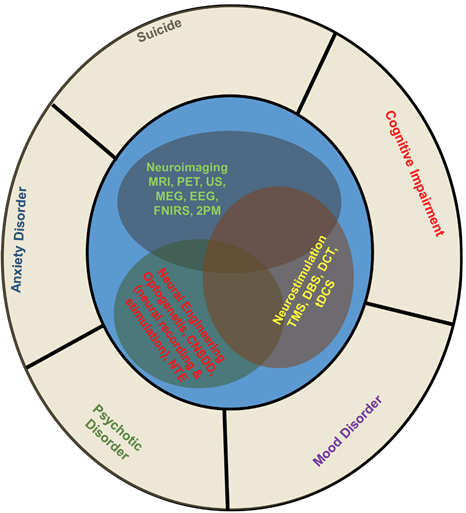Overall Vision and Goals
The goal of the Bioengineering in Psychiatry Training Program is to provide Bioengineering PhD students with a solid foundation in quantitative and computational science, and in the models and constructs of mental health research. Consistent with the NIMH strategic plan, we envision an increasing role for quantitative and computational science in psychiatric research. The trainees of this program will be uniquely qualified to help lead development and use new technical bioengineering approaches to address mental health research challenges. Not only, we envision that the graduates will become independent investigators leading their own programs of mental research, we expect them to contribute as members of the 32 faculty research programs to advance our understanding, prevention, and treatment of mental health disorders. This goal is accomplished via a coordinated and mentored interdisciplinary training program with a combination of core and elective courses, clinical experiences, research activities, and training opportunities to facilitate professional and career development. The training program incorporates faculty with varied background and expertise in bioengineering (neuroimaging, neurostimulation, and neural engineering) and in mental health disorders (mood disorder, anxiety, psychosis, suicide, and cognitive impairment) to provide a unique educational and research experience at the forefront of psychiatric research.
PROGRAM PLAN
Program Scientific Focus and Integration
The central theme that binds the research efforts of the program mentors is the focus on bioengineering in psychiatry, although specific perspective and emphasis of each mentor will vary. Within this broad theme, the research efforts of the mentors can be subdivided into three focus areas:
- Neuroimaging including, MRI: Magnetic Resonance Imaging; PET: Positron Emission Tomography; US: Ultrasound; MEG: Magnetoencephalography; EEG: Electroencephalography; FNIRS: Functional Near-Infrared Spectroscopy; 2PM: Two Photon Microscopy,
- Neurostimulation including TMS: Transcranial Magnetic Stimulation; DBS: Deep Brain Stimulation; ECT: Electroconvulsive Therapy; tDCS: Transcranial Direct-Current Stimulation, and
- Neuroengineering including CNS DD: Central Nervous System Drug Delivery; NTE: Neuronal Tissue Engineering.
It also includes 5 disorder clusters: a) mood disorder, b) anxiety disorder, c) psychotic disorder, d) suicide, and e) cognitive impairment. These disorder clusters span the range of interests of the faculty. Other psychiatric disorders may be included if interest arises and appropriate mentors are identified. This Program could also potentially include additional training opportunities in biomedical innovation and entrepreneurship through the Coulter Translational Research Partnership and the Center for Medical Innovation.

